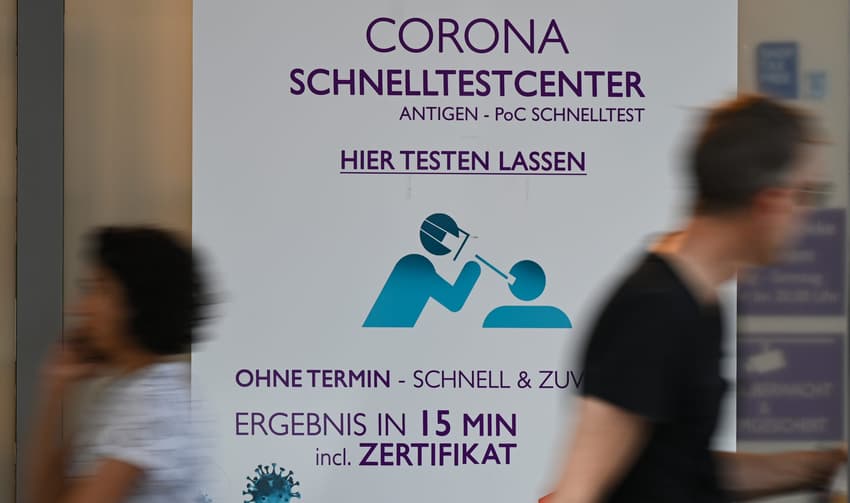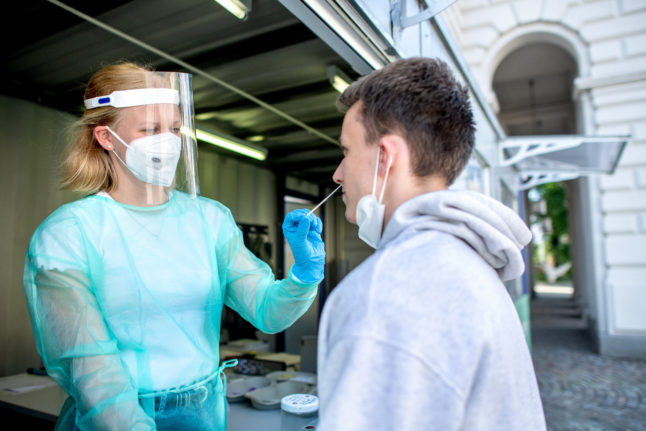EXPLAINED: The new rules on getting a Covid test in Germany

Most people now have to pay to get an antigen test in Germany. Here's what you should know about the new rules.
What's happening?
Until this point everyone in Germany was entitled to at least one free Covid-19 rapid test per week by trained staff. It included a test result certificate which could be delivered to the person by email or in paper.
But the free-for-all offer has now been "suspended", according to the Federal Ministry of Health.
The revised testing regulation with the new rules took effect on Thursday June 30th.
READ ALSO: Germany starts charging for Covid tests
Who will continue to get a free test?
The Health Ministry says the entitlement to so-called Bürgertests is intended to protect particularly vulnerable people.
These include people who cannot be vaccinated for medical reasons - like women in the first trimester of pregnancy.
Others to receive free access to tests include family carers and people with disabilities, as well as their carers.
Furthermore, household members of people who have Covid, children up to the age of five, and residents and visitors of nursing homes, institutions for people with disabilities and clinics do not have to pay for a rapid test.

A person gets a Covid test swab in Oldenburg. Photo: picture alliance/dpa | Hauke-Christian Dittrich
Visitors and people receiving treatment or residents in inpatient or outpatient hospital facilities can also get free tests, as well as people taking part in Covid clinical trials.
People who need proof that they are negative after a Covid-19 infection, so they can go back to work for example, can still get tested for free.
Employees of nursing homes and hospitals should continue to take Covid rapid tests in their facilities, says the Health Ministry.
How do people prove they are entitled to a free test?
Anyone who wants to claim free testing must identify themselves to the testing agency and provide proof. For example, a birth certificate or passport (for children), and the maternity pass for pregnant women.
Those who can't be vaccinated for medical reasons must present an official medical certificate from their doctor.
For those getting a test due to a household member being positive, they have to show the positive PCR test of their housemate and proof of matching residential address.
Who has to pay €3 to get a test?
The €3 tests are intended for private use, including for visits to family celebrations, concerts or another "indoor event", such as the theatre.
This is aimed at helping prevent so-called superspreader events, where many people get Covid at once.
A €3 test should also be granted to anyone who gets a red Covid warning on their Corona Warn app, or who plans to meet someone - or people - over the age of 60 or people with a pre-existing illness or disability.
Do you need to provide proof for this?
Yes. The Health Ministry says: "This can be done, for example, by showing an admission ticket to an event, the Corona Warning app or, in the case of contact with high-risk patients, a self-disclosure form or a digital registration process."
The person getting the test signs a document stating why they are getting the test.
Health Minister Karl Lauterbach said on Thursday that documenting why tests were taking place would help stop fraud as random checks can be carried out.
What other documents are required?
As before, an official photo ID has to be presented, such as a passport.
Will this be a bit confusing in practice?
It does appear to be a little unclear on how things will work. Plus many people in Germany, and tourists, won't know about the change in rules since it came about so quickly.
There was also some confusion on the point of visits to elderly or people with previous illnesses. People who visit relatives in clinics or nursing homes can still get a test free of charge. However, the regulation also states that those who want to meet with over-60s or those with previous illnesses must pay an additional €3 for a test.
A spokesman from the Health Ministry said the difference is whether the meeting is in an institution (where the test is free) or if it's a private meeting (where a €3 payment is due).
READ ALSO: Germany's planned changes to Covid vaccination status
Why is the test offer being restricted?
It was getting too expensive. According to Lauterbach, Bürgertests cost €1 billion per month. The government has reportedly spent more than €10.5 billion on free antigen tests during the pandemic, with suspected fraud of up to €1.5 billion.
The government is also reducing the amount that is given to the test centres per antigen test – from the current €11.50 to €9.50.
A total of €6.50 from the federal government will be added to the €3 to reimburse centres.
Will any German states take over the €3 contribution payment for a test?
Lauterbach previously referred to the possibility that federal states could take over the €3 payment for residents, or groups of residents.
The states, however, quickly signalled that there were no plans to do so.
The €3 would not be replaced "in any of the states", said Baden-Wuerttemberg's health minister Manne Lucha (Greens) on Tuesday.
What happens if you get Covid symptoms?
People with Covid symptoms should contact their GP. Doctors in Germany can order a PCR test as part of medical treatment if Covid-19, which will be covered by the patient's health insurance.
Comments
See Also
What's happening?
Until this point everyone in Germany was entitled to at least one free Covid-19 rapid test per week by trained staff. It included a test result certificate which could be delivered to the person by email or in paper.
But the free-for-all offer has now been "suspended", according to the Federal Ministry of Health.
The revised testing regulation with the new rules took effect on Thursday June 30th.
READ ALSO: Germany starts charging for Covid tests
Who will continue to get a free test?
The Health Ministry says the entitlement to so-called Bürgertests is intended to protect particularly vulnerable people.
These include people who cannot be vaccinated for medical reasons - like women in the first trimester of pregnancy.
Others to receive free access to tests include family carers and people with disabilities, as well as their carers.
Furthermore, household members of people who have Covid, children up to the age of five, and residents and visitors of nursing homes, institutions for people with disabilities and clinics do not have to pay for a rapid test.

Visitors and people receiving treatment or residents in inpatient or outpatient hospital facilities can also get free tests, as well as people taking part in Covid clinical trials.
People who need proof that they are negative after a Covid-19 infection, so they can go back to work for example, can still get tested for free.
Employees of nursing homes and hospitals should continue to take Covid rapid tests in their facilities, says the Health Ministry.
How do people prove they are entitled to a free test?
Anyone who wants to claim free testing must identify themselves to the testing agency and provide proof. For example, a birth certificate or passport (for children), and the maternity pass for pregnant women.
Those who can't be vaccinated for medical reasons must present an official medical certificate from their doctor.
For those getting a test due to a household member being positive, they have to show the positive PCR test of their housemate and proof of matching residential address.
Who has to pay €3 to get a test?
The €3 tests are intended for private use, including for visits to family celebrations, concerts or another "indoor event", such as the theatre.
This is aimed at helping prevent so-called superspreader events, where many people get Covid at once.
A €3 test should also be granted to anyone who gets a red Covid warning on their Corona Warn app, or who plans to meet someone - or people - over the age of 60 or people with a pre-existing illness or disability.
Do you need to provide proof for this?
Yes. The Health Ministry says: "This can be done, for example, by showing an admission ticket to an event, the Corona Warning app or, in the case of contact with high-risk patients, a self-disclosure form or a digital registration process."
The person getting the test signs a document stating why they are getting the test.
Health Minister Karl Lauterbach said on Thursday that documenting why tests were taking place would help stop fraud as random checks can be carried out.
What other documents are required?
As before, an official photo ID has to be presented, such as a passport.
Will this be a bit confusing in practice?
It does appear to be a little unclear on how things will work. Plus many people in Germany, and tourists, won't know about the change in rules since it came about so quickly.
There was also some confusion on the point of visits to elderly or people with previous illnesses. People who visit relatives in clinics or nursing homes can still get a test free of charge. However, the regulation also states that those who want to meet with over-60s or those with previous illnesses must pay an additional €3 for a test.
A spokesman from the Health Ministry said the difference is whether the meeting is in an institution (where the test is free) or if it's a private meeting (where a €3 payment is due).
READ ALSO: Germany's planned changes to Covid vaccination status
Why is the test offer being restricted?
It was getting too expensive. According to Lauterbach, Bürgertests cost €1 billion per month. The government has reportedly spent more than €10.5 billion on free antigen tests during the pandemic, with suspected fraud of up to €1.5 billion.
The government is also reducing the amount that is given to the test centres per antigen test – from the current €11.50 to €9.50.
A total of €6.50 from the federal government will be added to the €3 to reimburse centres.
Will any German states take over the €3 contribution payment for a test?
Lauterbach previously referred to the possibility that federal states could take over the €3 payment for residents, or groups of residents.
The states, however, quickly signalled that there were no plans to do so.
The €3 would not be replaced "in any of the states", said Baden-Wuerttemberg's health minister Manne Lucha (Greens) on Tuesday.
What happens if you get Covid symptoms?
People with Covid symptoms should contact their GP. Doctors in Germany can order a PCR test as part of medical treatment if Covid-19, which will be covered by the patient's health insurance.
Join the conversation in our comments section below. Share your own views and experience and if you have a question or suggestion for our journalists then email us at [email protected].
Please keep comments civil, constructive and on topic – and make sure to read our terms of use before getting involved.
Please log in here to leave a comment.